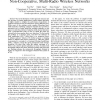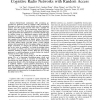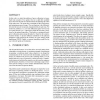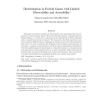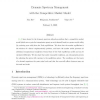135
Voted
ATAL
2011
Springer
14 years 29 days ago
2011
Springer
The field of multiagent decision making is extending its tools from classical game theory by embracing reinforcement learning, statistical analysis, and opponent modeling. For ex...
109
click to vote
ATAL
2011
Springer
14 years 29 days ago
2011
Springer
Recent applications of game theory in security domains use algorithms to solve a Stackelberg model, in which one player (the leader) first commits to a mixed strategy and then th...
139
click to vote
JAIR
2011
14 years 3 months ago
2011
There has been significant recent interest in game theoretic approaches to security, with much of the recent research focused on utilizing the leader-follower Stackelberg game mo...
111
click to vote
INFOCOM
2011
IEEE
14 years 4 months ago
2011
IEEE
—Due to the limitation of radio spectrum resource and fast growing of wireless applications, careful channel allocation is highly needed to mitigate the performance degradation o...
129
click to vote
INFOCOM
2011
IEEE
14 years 4 months ago
2011
IEEE
Abstract—Market-based mechanisms offer promising approaches for spectrum access in cognitive radio networks. In this paper, we focus on two market models, one with a monopoly pri...
128
Voted
ICALP
2011
Springer
14 years 4 months ago
2011
Springer
Abstract. Congestion games model several interesting applications, including routing and network formation games, and also possess attractive theoretical properties, including the ...
137
Voted
CORR
2011
Springer
14 years 4 months ago
2011
Springer
In this work, we study the problem of power allocation in teams. Each team consists of two agents who try to split their available power between the tasks of communication and jam...
85
Voted
MSS
2011
IEEE
14 years 4 months ago
2011
IEEE
This paper provides an analysis of discrimination and prejudices from the perspective of inductive game theory. We extend the festival game, originally given by Kaneko-Matsui, to ...
107
click to vote
TSP
2010
14 years 7 months ago
2010
[1, 2] have shown for the dynamic spectrum allocation problem that a competitive market model (which sets a price for transmission power on each channel) leads to a greater social...
119
click to vote
ML
2010
ACM
14 years 7 months ago
2010
ACM
Traditional classification methods assume that the training and the test data arise from the same underlying distribution. However, in several adversarial settings, the test set is...

